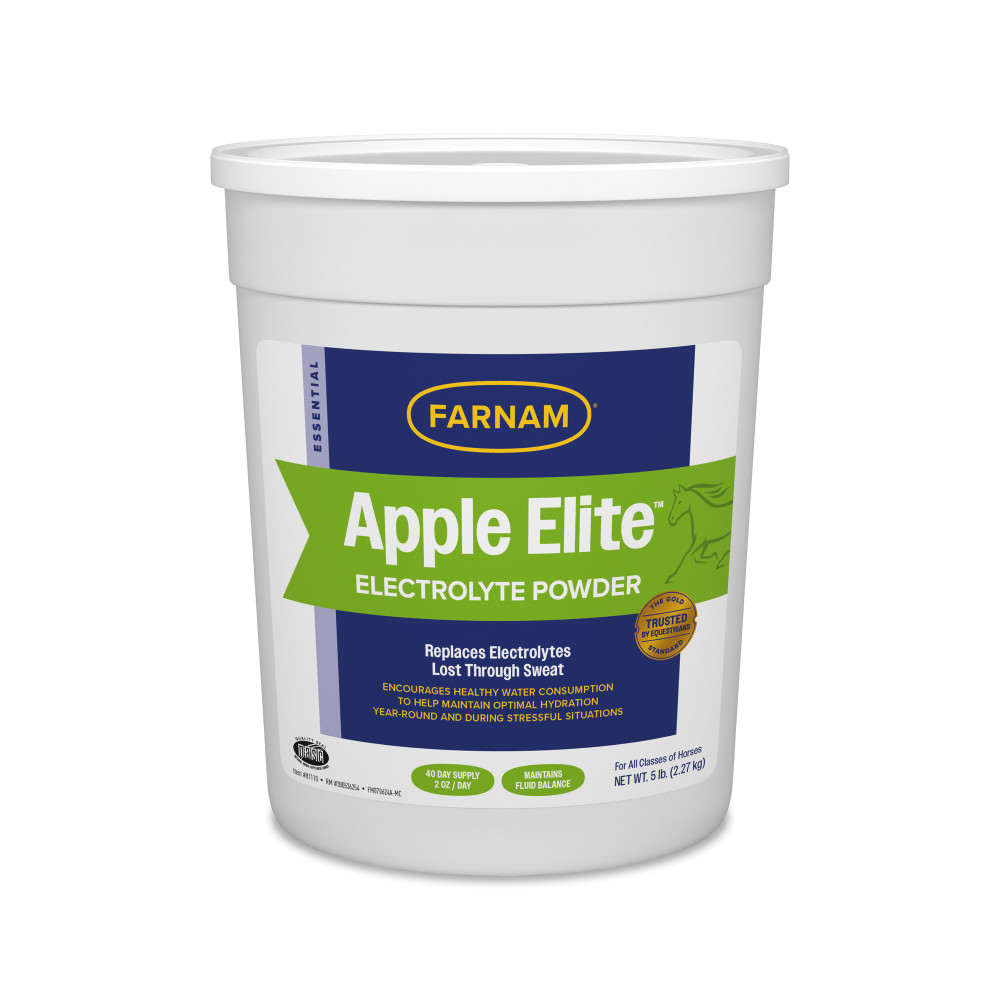Electrolytes Can Keep Horses Drinking During Winter Months

Outside, the wind is howling and blowing a cold rain against the barn. Inside, your horse is warm and dry in his stall, happily munching a big pile of hay.
The next morning when you come in to feed, you notice his water bucket is only down a few inches. You don’t think much of it as you go about your routine...but you should.
In the summer, we assume horses need more water because it’s hot and they’re sweating frequently. The irony is that a horse on summer pasture may not drink as much water as a horse eating hay, hay cubes or other dried forage in the winter. That’s because grass naturally has high water content, while hay typically contains less than 10 percent water.
“It is really of utmost importance that horses keep drinking in the cold weather. Sure, they aren’t sweating in the heat anymore, but their basic daily fluid requirement doesn’t change much just because the temperature drops,” cautions Martha Mallicote, DVM, a large animal internal medicine specialist at the University of Florida in Gainesville. “Since they are getting less water than when eating grass–a forage source that is over 50 percent water–they actually should be drinking more. Otherwise, you are creating a perfect situation that leads to impaction colics.”
The average 1,000-pound horse requires about 24 quarts of water daily, or just over five gallons. If that stalled horse mentioned above only drank a gallon or two in a 24-hour period, he could be setting himself up for trouble.
“When we are feeding hay or other dried forages, the horse needs to acquire all his water from drinking,” notes Mallicote. “It is even more important the horse achieves that mark, because of the hay he is eating and the risk that impactions can occur without adequate water intake.
”You might assume that horses will drink as much as they need when they need it. But horse owners are wise to encourage water consumption during the winter months–and whenever they are feeding a predominantly hay diet.
Most people think of electrolytes strictly for use in hot weather and when a horse is sweating a great deal, but they can be an important part of your horse’s health care maintenance during cold weather too.
“Electrolytes, or even just plain salt, are an excellent tool to encourage water intake,” says Mallicote. “I recommend that any horses prone to colic or decreased water intake be supplemented with a tablespoon of salt or serving of electrolytes twice a day in cold weather. This is especially important at times when weather is changing drastically. A cold spell or quick increase in temperature almost always occurs right before I see extra colic cases at the hospital.
The average 1,000-pound horse requires about 24 quarts of water daily, or just over five gallons.
”Adding electrolytes to your winter feeding routine will encourage your horse to drink more water, and that’s a good thing. So how can you be sure he’s getting them?
“Adding the electrolytes to feed ensures that most horses will eat them,” Mallicote notes. “If electrolytes are added to water or offered as a free-choice supplement, horses will usually choose to eat/drink them when the normal physiologic mechanism for decreased electrolyte concentrations kicks in.”
Because you want to ensure your horse is ingesting more salt and subsequently increasing his water intake, adding it to feed is the best plan. You can also offer electrolyte water, but any time you do this, you should also make a bucket of plain water available. (An exception to the “plain bucket rule” would be a sick animal under the care of a veterinarian.)
It’s important to note that HYPP horses (those with inherited hyperkalemic periodic paralysis) should not have potassium supplementation. Plain salt or electrolytes formulated for HYPP horses is an alternative.You can also encourage winter water consumption by making sure water isn’t overly cold.
“There is not a specific number in terms of desired water temperature, but many horses will preferentially drink warm water when the weather is cold. Interestingly, they may even drink a substantial amount of their daily requirements within the first 30 to 60 minutes after you hang a fresh bucket of warm water,” notes Mallicote. “They certainly do seem to prefer the option of warm water instead of the cold bucket of water that may already be hanging in their stalls.”If you live where the temperature routinely drops below freezing, you should take steps to provide a constant source of water to keep horses drinking. In the barn, you may use heated buckets. Outside, you can add heaters to water tanks. Just be certain all electrical components are designed for the intended use and that horses cannot access any “hot” wires.
“Make sure that rodents and dust aren’t complicating the connection,” adds Mallicote. “An electricity mishap can result in a water bucket that shocks the animal trying to drink out of it or even worse, a barn fire.”
Life with Horses Newsletter
Sign up now to stay connected with free helpful horse care tips, product updates, and special offers.
Featured Products
Related Articles
Keep Your Horse Well-Hydrated at Home & on the Road
If you could snap your fingers and remove all the water from your horse’s body, there wouldn’t be a whole lot left. The average adult horse’s body contains approximately 70% water. In other words, there are roughly 700 pounds of water in the average 1,000 lb. horse...






